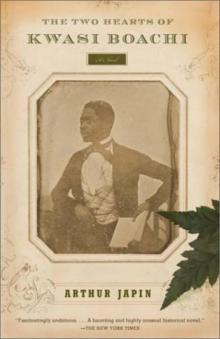The Two Hearts of Kwasi Boachi: A Novel 

by Arthur Japin
Genre: Historical
Published: 2007
View: 6998
Read OnlineRead The Two Hearts of Kwasi Boachi: A Novel Storyline:
“The first ten years of my life I was not black.” Thus begins this startlingly eloquent and beautiful tale based on the true story of Kwasi Boachi, a 19th- century African prince who was sent with his cousin, Kwame, to be raised in Holland as a guest of the royal family. Narrated by Kwasi himself, the story movingly portrays the perplexing dichotomy of the cousins' situation: black men of royal ancestry, they are subject to insidious bigotry even as they enjoy status among Europe’s highest echelons. As their lives wind down different paths–Kwame back to Africa where he enlists in the Dutch army, Kwasi to an Indonesian coffee plantation where success remains mysteriously elusive–they become aware of a terrible truth that lies at the heart of their experiences. Vivid, subtle, poignant and profound, The Two Hearts of Kwasi Boachi is an exquisite masterpiece of story and craft, a heartrending work that places Arthur Japin on a shelf that includes Joseph Conrad, J.M. Coetzee, Kazuo Ishiguro and Nadine Gordimer. From the Trade Paperback edition.From Publishers WeeklyDutch singer/actor Japin's debut draws on extraordinary real-life material: in 1837 two young Ashanti princes, Kwasi and Kwame, were taken to Holland, ostensibly to receive a European education, but in fact as peons in a cynical exchange between the Ashanti king (Kwame's father) and the still active slave traders. Kwasi tells the strange story as a gentle, peevish old man living on a failed coffee plantation in Java at the turn of the century. He remembers his jungle boyhood with cousin Kwame, the coming of the Dutch traders and his and Kwame's early years as curiosities at a Dutch school. Later embraced by the royal court, the two went on to college and became offbeat figures in Dutch society, struggling to persuade themselves that they had really found a new life. Kwasi, the more adaptable, cherished a passion for a Dutch princess until she married elsewhere for convenience. Kwame, deeply uneasy at his equivocal role, joined the army and was posted back to Africa where, eventually realizing that he was a mere plaything of the Dutch, he killed himself. Only toward the end of his life is Kwasi aware that he, too, has lived in self-deception. Japin tells the tale with imaginative empathy and, in the case of Kwame, truly powerful poetic re-creation. However, his incorporation of text from authentic 19th-century documents is disconcerting. This is an unusual story that could appeal to an appetite for the odd corners of history, but perhaps is too close to history to please the lovers of literary fiction who would at first seem to be its natural readers. (Nov. 21) Copyright 2000 Reed Business Information, Inc. From BooklistJapin's beautifully written debut novel is based on the true story of two West African princes, Kwasi and Kwame, who are sent by the king of Ashanti (modern-day Ghana) to study in Holland in the 1830s. In Holland, they attend a private boarding school, where Kwasi excels at his studies and Kwame at art. Neither boy fits in; they are ridiculed by some and shunned by others. Kwame never ceases to long for the day he can return home to Africa, whereas Kwasi embraces the new culture and tries to blend in as much as possible. The boys' different reactions to Dutch culture drive a wedge between them, and they choose separate paths. As Kwame tries to return home, Kwasi accepts a government post, only to encounter prejudice from every side. Both face harsh disappointments: Kwame from the home he thought would not forsake him, and Kwasi from the realization that the abandonment of his native culture has harmed him most of all. Quietly moving, Japin's novel is a powerful study of displacement and disillusionment. Kristine HuntleyCopyright © American Library Association. All rights reservedPages of The Two Hearts of Kwasi Boachi: A Novel :